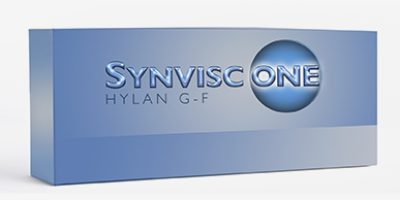Synvisc-One Knee Injections
Sanofi Genzyme’s Synvisc-One injections supplement natural synovial fluid in the knee. The gel cushions bones and relieves osteoarthritis pain. Common side effects include swelling, knee pain and allergic reactions. In 2017, the company discovered bacterial contamination and recalled 18,000 syringes.
- Medically reviewed by Jessica D. Hess, Ph.D.
- Last update: March 7, 2025
Synvisc-One is an injectable arthritis gel made from a substance called hyaluronan, which is harvested from the fleshy crest on chickens’ heads called chicken combs. The human body also contains hyaluronan.
The U.S. Food and Drug Administration approved the gel injection in 2009 to treat osteoarthritis of the knee in people who cannot manage their pain without medication or with pain relievers like acetaminophen. As of 2022, Sanofi Genzyme makes the medication.
The gel is pre-packaged in syringes and should only be injected by doctors. One injection can provide pain relief for up to six months, according to the product’s website. Each syringe costs about $1,268, a spokeswoman for the company’s French parent, Sanofi SA, told The Boston Globe.
The most reported side effects in clinical trials include joint pain, injection site pain and fluid buildup. After the drug was on the market, some people who received the three-injection regime reported issues such as rash, hives, headaches, dizziness, muscle cramps and swelling.
In December 2017, Sanofi Genzyme recalled thousands of the syringes “due to an ongoing investigation which revealed the presence of microbial contamination.” Patients who suffered complications after they received a contaminated injection are suing the manufacturer.
How Synvisc-One Knee Injections Work
People with osteoarthritis lose the natural lubrication fluid in their knee joint. Synvsic-One supplements this fluid and helps to cushion and lubricate the joint to relieve pain, according to a video on the product’s website.
Genzyme introduced its original Synvisc in 1997. The original drug required three separate injections one week apart. Synvisc-One combines three doses of Synvisc and allows for a single injection that may provide pain relief for up to six months.
Before administering the injection, the health care provider will use an 18- to 20-gauge needle to remove any existing synovial fluid or other liquid present in the knee joint. Then, the doctor will inject the drug directly into the knee joint.
Dosage and Ingredients
Each Synvisc-One 10 mL syringe contains three 2 mL doses to be administered in one injection using an 18- to 20-gauge needle.
Each syringe contains:
- Hylan polymers (hylan A + hylan B) 48 mg
- Sodium chloride 51 mg
- Disodium hydrogen phosphate 0.96 mg
- Sodium dihydrogen phosphate monohydrate 0.24 mg
- Water for injection q.s. to 6.0 mL
Warnings and Precautions
Synvisc-One is not for everyone. Some people may have preexisting conditions or allergies that may cause complications.
- People who are allergic to hyaluronan should not use Synvisc-One.
- People with joint infections or skin diseases at the injection site should not get the injection.
- People who are allergic to avian proteins, feathers or egg products should use the drug with caution.
- People with evidence of lymphatic or venous stasis in the leg that’s to be injected should use the drug with caution.
- Safety and effectiveness in pregnant women or people 21 years old or younger have not been established.
Clinical Studies
To market Synvisc-One, Sanofi Genzyme applied for premarket approval or PMA through the FDA. This process requires clinical trials for safety and efficacy.
The study the company submitted for PMA approval involved 21 sites in Belgium, Czech Republic, France, Germany, the Netherlands and the United Kingdom, according to Synvisc-One’s Summary of Safety and Effectiveness Data (SSED) submitted to the FDA.
In the study, 253 patients received either Synvisc-One or phosphate buffered saline between May 2005 and September 2006. Researchers followed participants for 26 weeks. Then, they gave participants a second injection at their 26-week visit.
At the beginning of the study, participants had moderate or severe knee pain when they walked on a flat surface. There was a “statistically significant” improvement in osteoarthritis pain symptoms at the end of 26 weeks.
“The double-blind, saline-controlled study demonstrated that a single injection of 6 mL of Synvisc-One is effective in providing symptomatic relief up to 26 weeks in patients with primary knee [osteoarthritis],” the report said.
18,000 Injections Recalled
On Dec. 11, 2017, Sanofi Genzyme announced that an investigation had revealed “the presence of microbial contamination” in some Synvisc-One syringes. The company recalled a single lot of the arthritis treatment.
- Lot Number:
- 7RSL021
- Expiration Date:
- May 31, 2020
- Distributed Between:
- Oct. 25, 2017 and Nov. 7, 2017
- FDA Recall Classification:
- Class 2
The lot contained 18,000 syringes, including 12,380 that had already been distributed to 36 states in the United States. The recall notice told doctors to be “aware of the potential of a gram-negative infection.”
Gram-negative bacteria include E. coli, Salmonella and other hard to treat bacteria. Many have developed antibiotic resistance. They can lead to serious complications including pneumonia and bloodstream infections.
On Dec. 19, 2017, Sanofi Genzyme sent out a recall update to inform customers that the specific bacteria found were Methylobacterium thiocyanatum.
Calling this number connects you with a Drugwatch.com representative. We will direct you to one of our trusted legal partners for a free case review.
Drugwatch.com's trusted legal partners support the organization's mission to keep people safe from dangerous drugs and medical devices. For more information, visit our partners page.


